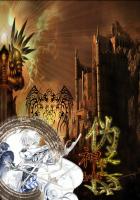Then they kissed each other and, having retrieved his alpenstock from the stick-house, Godfrey trudged back to the station, where he picked up his luggage and departed for London. Arriving at Liverpool Street rather late, he went to the Great Eastern Hotel, and after a good meal, which he needed, slept like a top. His reception in England had been bitter, but the young soon shake off their troubles, from which, indeed, the loving kindness of his dear old nurse already had extracted the sting.
On the following morning, while breakfasting at a little table by one of the pillars of the big dining-room, he began to wonder what he should do next. In his pocket he had a notebook, in which, at the suggestion of the Pasteur, he had set down the address of the lawyers who had written to him about his legacy. It was in a place called the Poultry, which, on inquiry from the hall-porter, he discovered was quite close by the Mansion House.
So a while later, for the porter told him that it was no use to go to see lawyers too early, he sallied forth, and after much search discovered the queer spot called the Poultry, also the offices of Messrs. Ranson, Richards and Son. Here he gave his name to a clerk, who thrust a very oily head out of a kind of mahogany box, and was told that Mr. Ranson was engaged, but that, if he cared to wait, perhaps he would see him later on. He said he would wait, and was shown into a stuffy little room, furnished with ancient deed-boxes and a very large, old leather-covered sofa that took up half the place.
Here he sat for a while, staring at a square of dirty glass which gave what light was available, and reflecting upon things in general.
While he was thus engaged he heard a kind of tumult outside, in which he recognised the treble of the oily-headed clerk coming in a bad second to a deep, bass voice. Then the door opened and a big, burly man, with a red face and a jovial, rolling eye, appeared with startling suddenness and ejaculated:
"Damn Ranson, damn Richards, or damn them both, with the Son thrown in! I ask you, young man"--here he addressed Godfrey seated on the corner of the sofa--"what is the use of a firm of lawyers whom you can never see? You pay the brutes, but three times out of four they are not visible, or, as I suspect, pretend not to be, in order to enhance their own importance. And I sent them a telegram, too, having a train to catch. What do you think?"
"I don't know, Sir," Godfrey answered. "I never came to a lawyer's office before, and I hope I shan't again if this is the kind of room they put one into."
"Room!" ejaculated the irate gentleman, "call it a dog kennel, call it a cesspool, for, by heaven, it smells like one, but in the interests of truth, young man, don't call it a room."
"Now that you mention it, there is a queer odour. Perhaps a dead rat under the floor," suggested Godfrey.
"Twenty dead rats, probably, since I imagine that this hole has not been cleaned since the time of George II. We are martyrs in this world, Sir. I come here to attend to the affairs of some whippersnapper whom I never saw and never want to see, just because Helen Ogilvy, who was my first cousin, chooses to make me a trustee of her confounded will, in which she leaves money to the confounded whippersnapper, God knows why. This whippersnapper has a father, a parson, who can write the most offensive letters imaginable. I received one of them this morning, accusing the whippersnapper of all sorts of vague things, and me and my fellow trustee, who is at present enjoying himself travelling, of abetting him. I repeat, damn Ranson, Richards and Son; damn the parson, damn Helen--no, I won't say that, for she is dead--and especially damn the whippersnapper. Don't you agree with me?"
"Not quite, Sir," said Godfrey. "I don't mind about Ranson, Richards and Son, or anybody else, but I don't quite see why you should damn me, who, I am sure, never wished to give you any trouble."
"You! And who the Hades may you be?"
"I am Godfrey Knight, and I suppose that you are my trustee, or one of them."
"Godfrey Knight, the young man whose father gives us so much trouble, all at our own expense, I may remark. Well, after hearing so much of you on paper, I'm deuced glad to meet you in the flesh. Come into the light, if you can call it light, and let me have a look at you."
Godfrey stepped beneath the dirty pane and was contemplated through an eyeglass by this breezy old gentleman, who exclaimed presently:
"You're all right, I think; a fine figure of a young man, not bad looking, either, but you want drilling. Why the devil don't you go into the army?"
"I don't know," answered Godfrey, "never thought of it. Are you in the army, Sir?"
"No, not now, though I was. Commanded my regiment for five years, and then kicked out with the courtesy title of Major-General. Cubitte is my name, spelt with two 't's' and an 'e,' please, and don't you forget that, since that 'e' has been a point of honour with our family for a hundred years, the Lord knows why. Well, there we are. Do you smoke?"
"Only a pipe," said Godfrey.
"That's right; I hate those accursed cigarettes, still they are better than nothing. Now sit down and tell me all about yourself."
Godfrey obeyed, and somehow feeling at ease with this choleric old General, in the course of the next twenty minutes explained many things to him, including the cause of his appearance in that office.
"So you don't want to be a parson," said the General, "and with your father's example before your eyes, I am sure I don't wonder. However, you are independent of him more or less, and had better cut out a line for yourself. We will back you. What do you say to the army?"
"I think I should rather like that," answered Godfrey. "Only, only, I want to get out of England as soon as possible."















